Organisational Behaviour in BBC: Culture, Power, Motivation Analysis
VerifiedAdded on 2024/05/17
|24
|4533
|334
Report
AI Summary
This report provides a comprehensive analysis of organisational behaviour within the BBC, addressing issues related to culture, communication, management, and discrimination. It examines the impact of culture, power, and politics on employee behaviour, evaluating motivation strategies for individuals and teams. The report utilizes Handy's cultural typology and various motivation theories, including Maslow's hierarchy of needs, Herzberg's motivator-hygiene theory, and goal-setting theory, to assess and suggest improvements. Furthermore, it identifies different types of teams within the BBC and explores factors contributing to effective teamwork, referencing Tuckman and Jensen's model of team development and Belbin's team roles. The report also suggests how to improve teamwork and productivity using concepts like path-goal theory, while highlighting the main barriers to effective performance within the BBC, providing a holistic view of the organisation's internal dynamics.
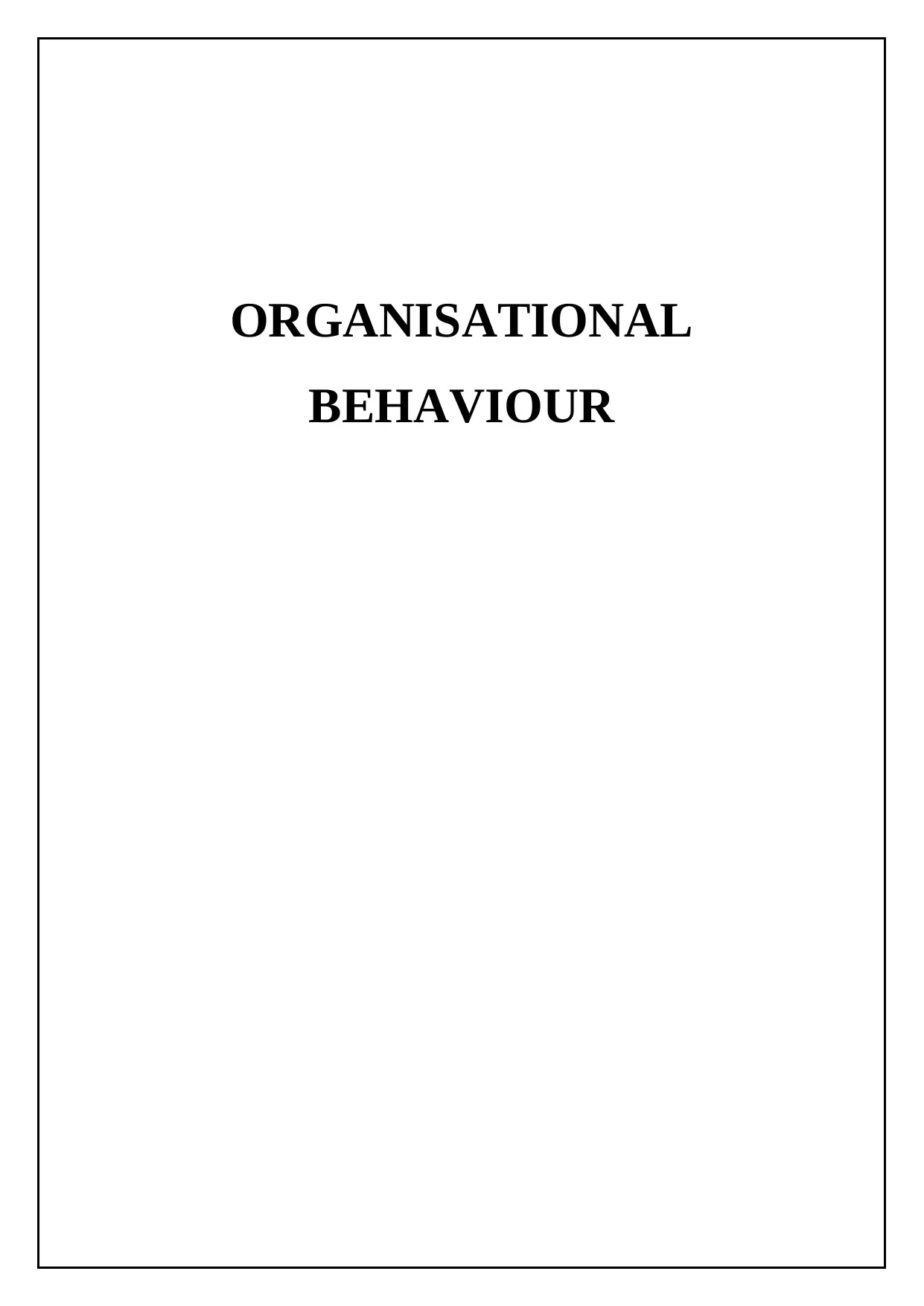
ORGANISATIONAL
BEHAVIOUR
BEHAVIOUR
Paraphrase This Document
Need a fresh take? Get an instant paraphrase of this document with our AI Paraphraser
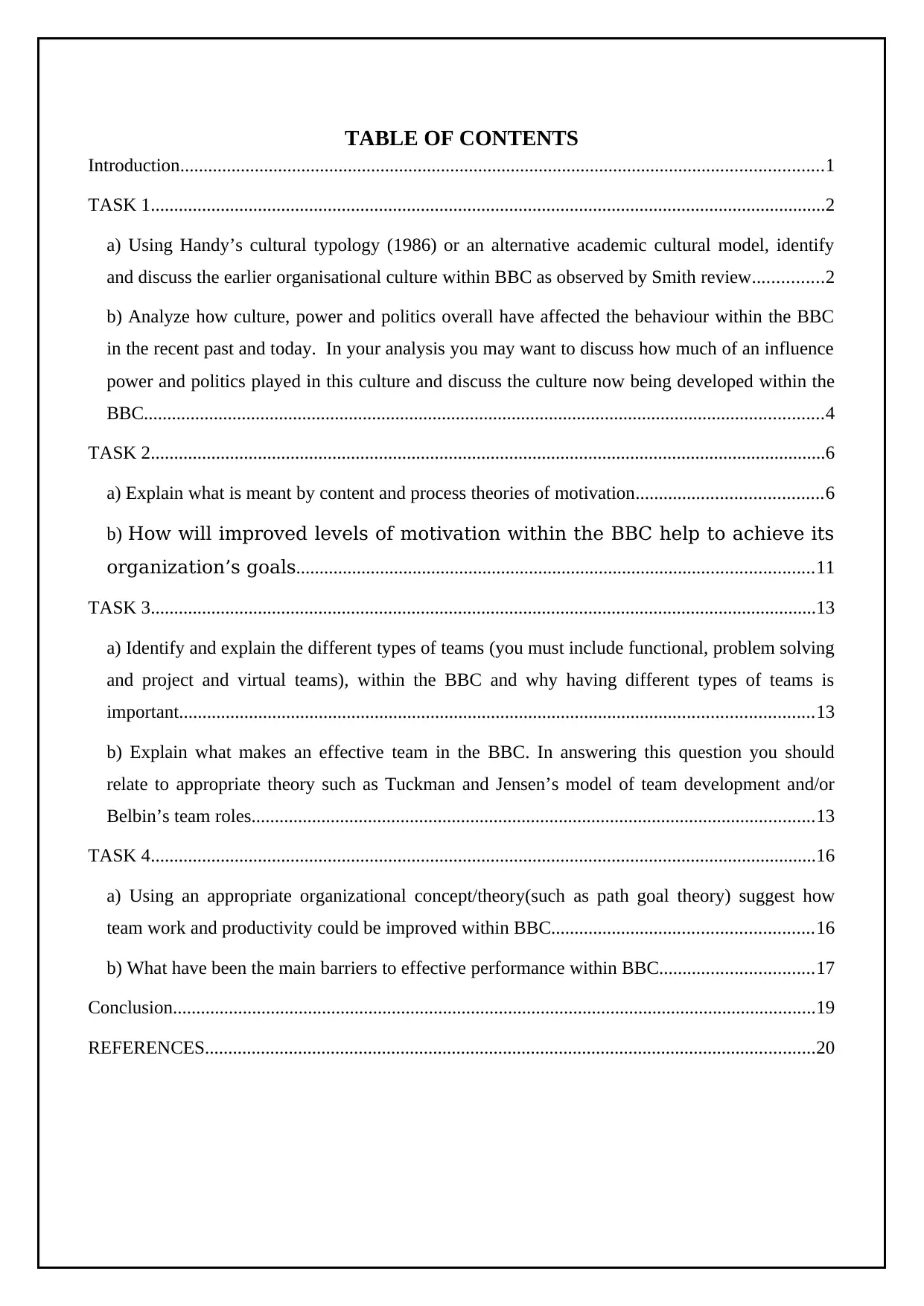
TABLE OF CONTENTS
Introduction..........................................................................................................................................1
TASK 1.................................................................................................................................................2
a) Using Handy’s cultural typology (1986) or an alternative academic cultural model, identify
and discuss the earlier organisational culture within BBC as observed by Smith review...............2
b) Analyze how culture, power and politics overall have affected the behaviour within the BBC
in the recent past and today. In your analysis you may want to discuss how much of an influence
power and politics played in this culture and discuss the culture now being developed within the
BBC..................................................................................................................................................4
TASK 2.................................................................................................................................................6
a) Explain what is meant by content and process theories of motivation........................................6
b) How will improved levels of motivation within the BBC help to achieve its
organization’s goals...............................................................................................................11
TASK 3...............................................................................................................................................13
a) Identify and explain the different types of teams (you must include functional, problem solving
and project and virtual teams), within the BBC and why having different types of teams is
important........................................................................................................................................13
b) Explain what makes an effective team in the BBC. In answering this question you should
relate to appropriate theory such as Tuckman and Jensen’s model of team development and/or
Belbin’s team roles.........................................................................................................................13
TASK 4...............................................................................................................................................16
a) Using an appropriate organizational concept/theory(such as path goal theory) suggest how
team work and productivity could be improved within BBC........................................................16
b) What have been the main barriers to effective performance within BBC.................................17
Conclusion..........................................................................................................................................19
REFERENCES...................................................................................................................................20
Introduction..........................................................................................................................................1
TASK 1.................................................................................................................................................2
a) Using Handy’s cultural typology (1986) or an alternative academic cultural model, identify
and discuss the earlier organisational culture within BBC as observed by Smith review...............2
b) Analyze how culture, power and politics overall have affected the behaviour within the BBC
in the recent past and today. In your analysis you may want to discuss how much of an influence
power and politics played in this culture and discuss the culture now being developed within the
BBC..................................................................................................................................................4
TASK 2.................................................................................................................................................6
a) Explain what is meant by content and process theories of motivation........................................6
b) How will improved levels of motivation within the BBC help to achieve its
organization’s goals...............................................................................................................11
TASK 3...............................................................................................................................................13
a) Identify and explain the different types of teams (you must include functional, problem solving
and project and virtual teams), within the BBC and why having different types of teams is
important........................................................................................................................................13
b) Explain what makes an effective team in the BBC. In answering this question you should
relate to appropriate theory such as Tuckman and Jensen’s model of team development and/or
Belbin’s team roles.........................................................................................................................13
TASK 4...............................................................................................................................................16
a) Using an appropriate organizational concept/theory(such as path goal theory) suggest how
team work and productivity could be improved within BBC........................................................16
b) What have been the main barriers to effective performance within BBC.................................17
Conclusion..........................................................................................................................................19
REFERENCES...................................................................................................................................20
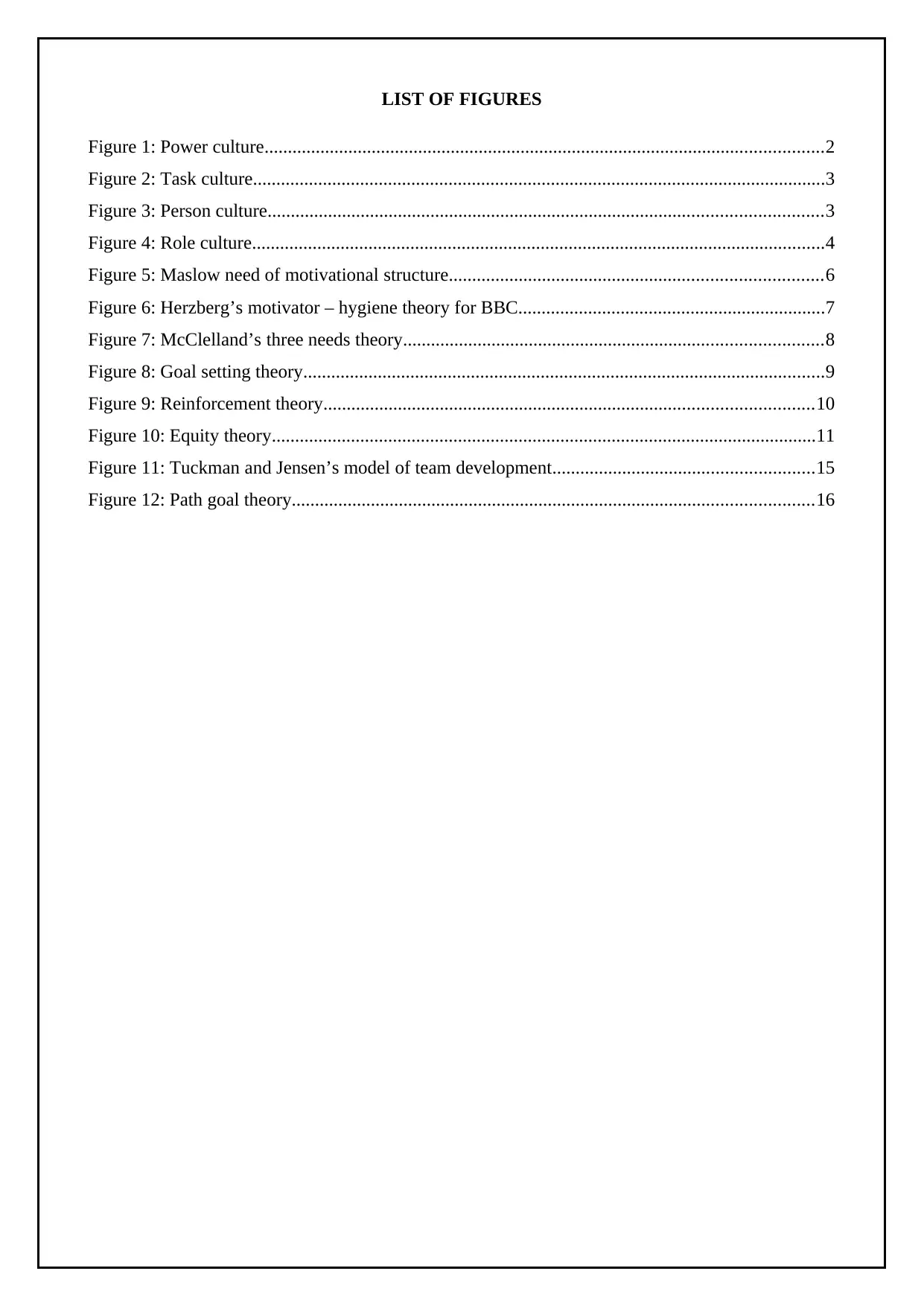
LIST OF FIGURES
Figure 1: Power culture........................................................................................................................2
Figure 2: Task culture...........................................................................................................................3
Figure 3: Person culture.......................................................................................................................3
Figure 4: Role culture...........................................................................................................................4
Figure 5: Maslow need of motivational structure................................................................................6
Figure 6: Herzberg’s motivator – hygiene theory for BBC..................................................................7
Figure 7: McClelland’s three needs theory..........................................................................................8
Figure 8: Goal setting theory................................................................................................................9
Figure 9: Reinforcement theory.........................................................................................................10
Figure 10: Equity theory.....................................................................................................................11
Figure 11: Tuckman and Jensen’s model of team development........................................................15
Figure 12: Path goal theory................................................................................................................16
Figure 1: Power culture........................................................................................................................2
Figure 2: Task culture...........................................................................................................................3
Figure 3: Person culture.......................................................................................................................3
Figure 4: Role culture...........................................................................................................................4
Figure 5: Maslow need of motivational structure................................................................................6
Figure 6: Herzberg’s motivator – hygiene theory for BBC..................................................................7
Figure 7: McClelland’s three needs theory..........................................................................................8
Figure 8: Goal setting theory................................................................................................................9
Figure 9: Reinforcement theory.........................................................................................................10
Figure 10: Equity theory.....................................................................................................................11
Figure 11: Tuckman and Jensen’s model of team development........................................................15
Figure 12: Path goal theory................................................................................................................16
⊘ This is a preview!⊘
Do you want full access?
Subscribe today to unlock all pages.

Trusted by 1+ million students worldwide
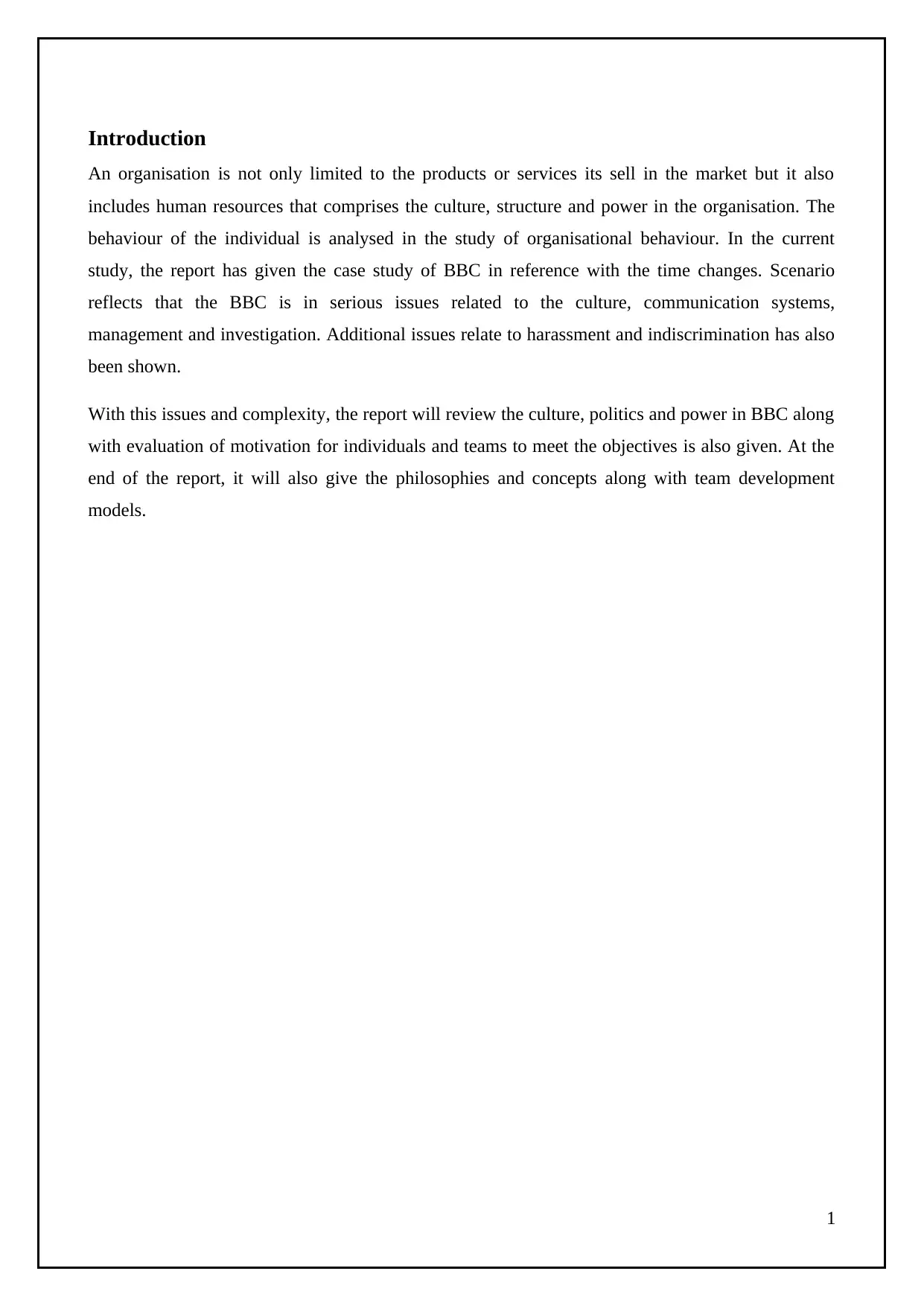
Introduction
An organisation is not only limited to the products or services its sell in the market but it also
includes human resources that comprises the culture, structure and power in the organisation. The
behaviour of the individual is analysed in the study of organisational behaviour. In the current
study, the report has given the case study of BBC in reference with the time changes. Scenario
reflects that the BBC is in serious issues related to the culture, communication systems,
management and investigation. Additional issues relate to harassment and indiscrimination has also
been shown.
With this issues and complexity, the report will review the culture, politics and power in BBC along
with evaluation of motivation for individuals and teams to meet the objectives is also given. At the
end of the report, it will also give the philosophies and concepts along with team development
models.
1
An organisation is not only limited to the products or services its sell in the market but it also
includes human resources that comprises the culture, structure and power in the organisation. The
behaviour of the individual is analysed in the study of organisational behaviour. In the current
study, the report has given the case study of BBC in reference with the time changes. Scenario
reflects that the BBC is in serious issues related to the culture, communication systems,
management and investigation. Additional issues relate to harassment and indiscrimination has also
been shown.
With this issues and complexity, the report will review the culture, politics and power in BBC along
with evaluation of motivation for individuals and teams to meet the objectives is also given. At the
end of the report, it will also give the philosophies and concepts along with team development
models.
1
Paraphrase This Document
Need a fresh take? Get an instant paraphrase of this document with our AI Paraphraser
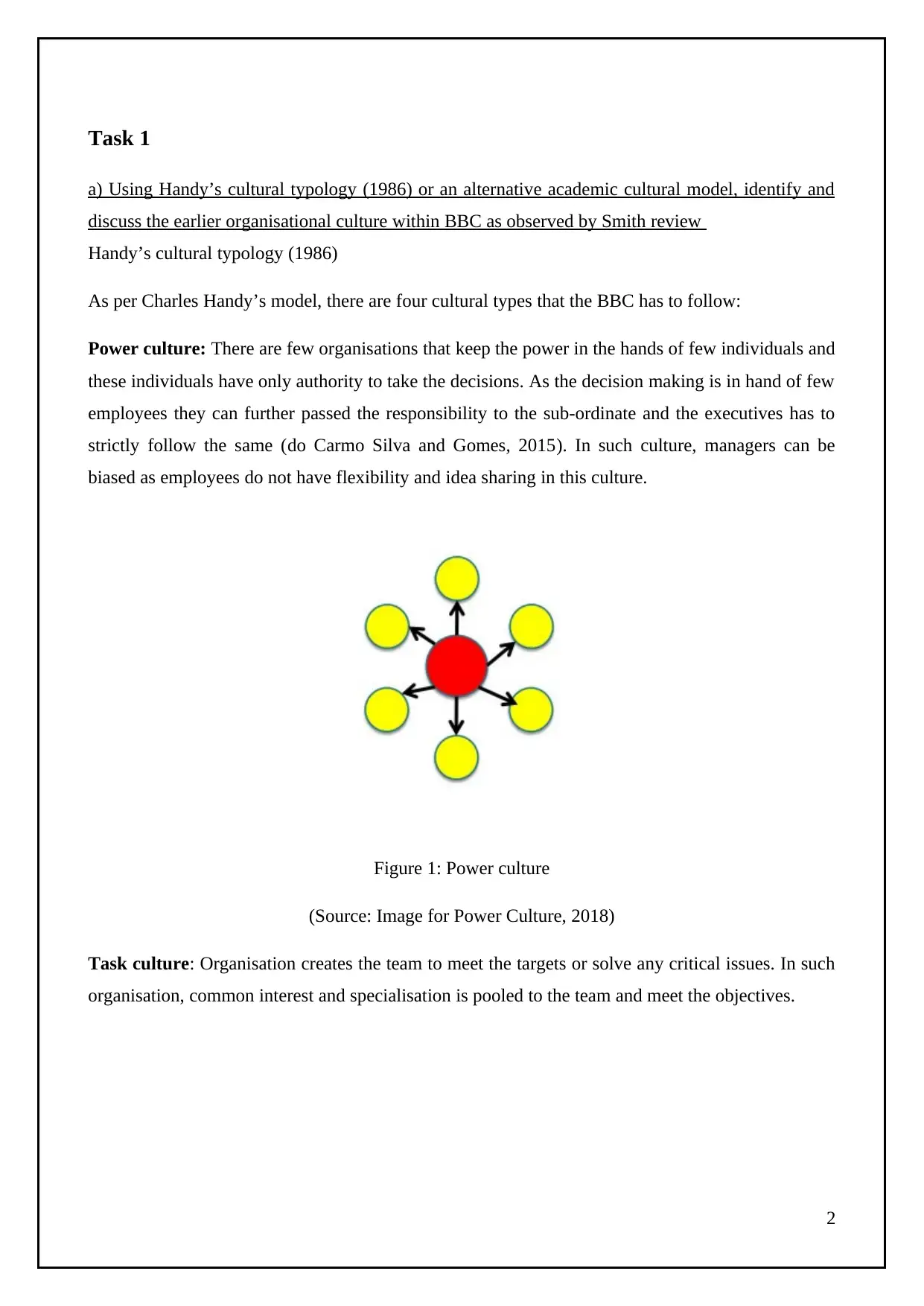
Task 1
a) Using Handy’s cultural typology (1986) or an alternative academic cultural model, identify and
discuss the earlier organisational culture within BBC as observed by Smith review
Handy’s cultural typology (1986)
As per Charles Handy’s model, there are four cultural types that the BBC has to follow:
Power culture: There are few organisations that keep the power in the hands of few individuals and
these individuals have only authority to take the decisions. As the decision making is in hand of few
employees they can further passed the responsibility to the sub-ordinate and the executives has to
strictly follow the same (do Carmo Silva and Gomes, 2015). In such culture, managers can be
biased as employees do not have flexibility and idea sharing in this culture.
Figure 1: Power culture
(Source: Image for Power Culture, 2018)
Task culture: Organisation creates the team to meet the targets or solve any critical issues. In such
organisation, common interest and specialisation is pooled to the team and meet the objectives.
2
a) Using Handy’s cultural typology (1986) or an alternative academic cultural model, identify and
discuss the earlier organisational culture within BBC as observed by Smith review
Handy’s cultural typology (1986)
As per Charles Handy’s model, there are four cultural types that the BBC has to follow:
Power culture: There are few organisations that keep the power in the hands of few individuals and
these individuals have only authority to take the decisions. As the decision making is in hand of few
employees they can further passed the responsibility to the sub-ordinate and the executives has to
strictly follow the same (do Carmo Silva and Gomes, 2015). In such culture, managers can be
biased as employees do not have flexibility and idea sharing in this culture.
Figure 1: Power culture
(Source: Image for Power Culture, 2018)
Task culture: Organisation creates the team to meet the targets or solve any critical issues. In such
organisation, common interest and specialisation is pooled to the team and meet the objectives.
2
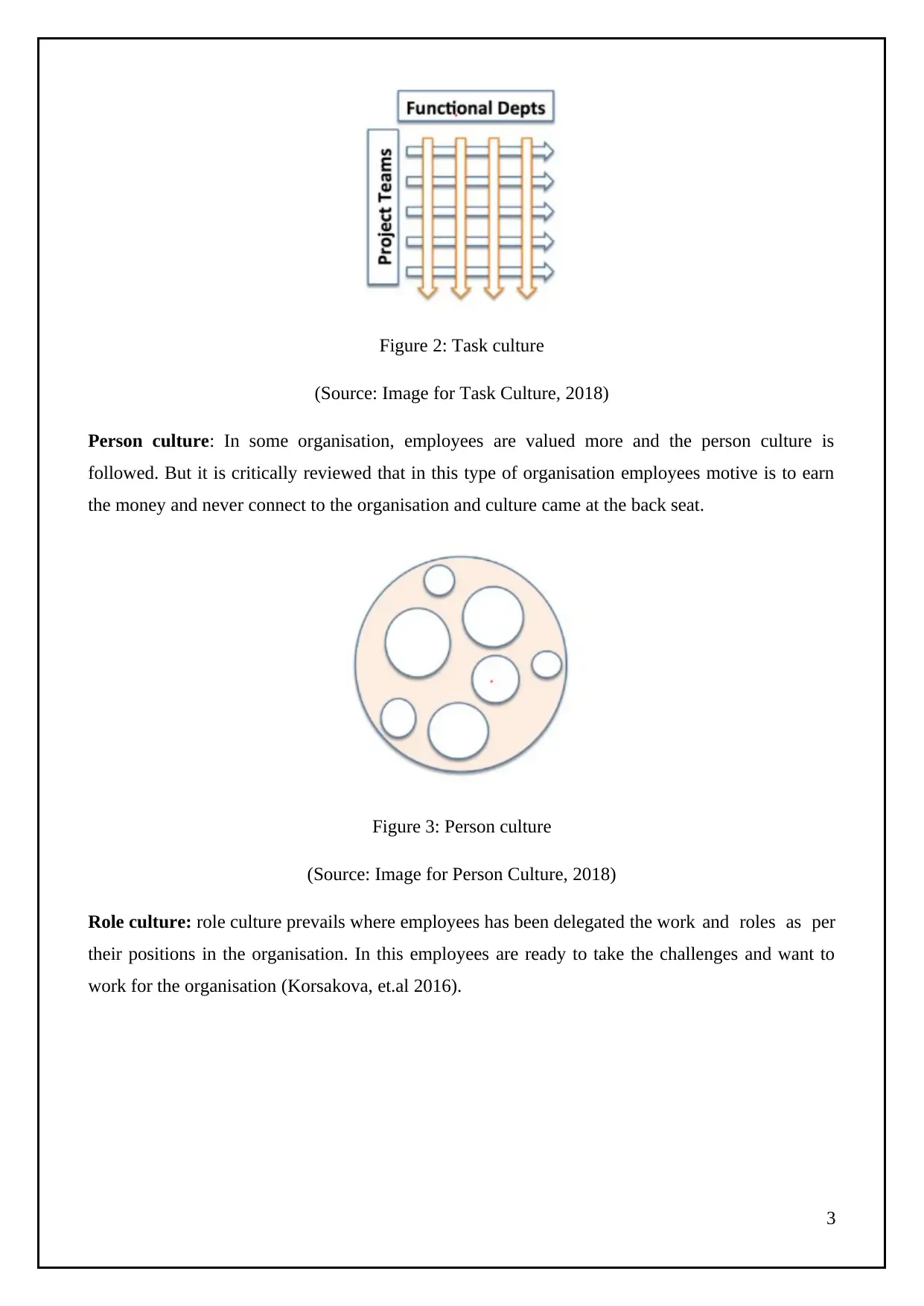
Figure 2: Task culture
(Source: Image for Task Culture, 2018)
Person culture: In some organisation, employees are valued more and the person culture is
followed. But it is critically reviewed that in this type of organisation employees motive is to earn
the money and never connect to the organisation and culture came at the back seat.
Figure 3: Person culture
(Source: Image for Person Culture, 2018)
Role culture: role culture prevails where employees has been delegated the work and roles as per
their positions in the organisation. In this employees are ready to take the challenges and want to
work for the organisation (Korsakova, et.al 2016).
3
(Source: Image for Task Culture, 2018)
Person culture: In some organisation, employees are valued more and the person culture is
followed. But it is critically reviewed that in this type of organisation employees motive is to earn
the money and never connect to the organisation and culture came at the back seat.
Figure 3: Person culture
(Source: Image for Person Culture, 2018)
Role culture: role culture prevails where employees has been delegated the work and roles as per
their positions in the organisation. In this employees are ready to take the challenges and want to
work for the organisation (Korsakova, et.al 2016).
3
⊘ This is a preview!⊘
Do you want full access?
Subscribe today to unlock all pages.

Trusted by 1+ million students worldwide
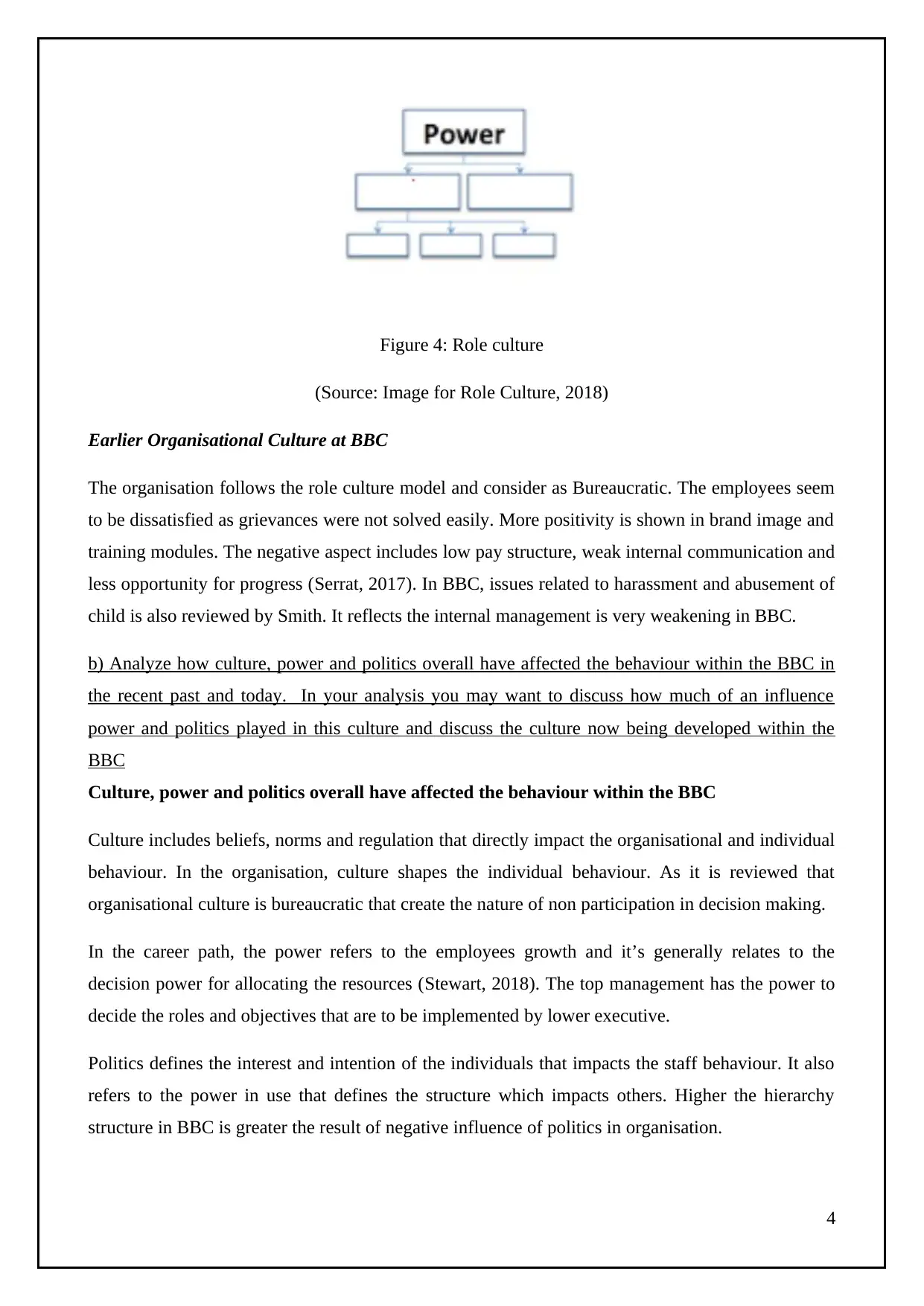
Figure 4: Role culture
(Source: Image for Role Culture, 2018)
Earlier Organisational Culture at BBC
The organisation follows the role culture model and consider as Bureaucratic. The employees seem
to be dissatisfied as grievances were not solved easily. More positivity is shown in brand image and
training modules. The negative aspect includes low pay structure, weak internal communication and
less opportunity for progress (Serrat, 2017). In BBC, issues related to harassment and abusement of
child is also reviewed by Smith. It reflects the internal management is very weakening in BBC.
b) Analyze how culture, power and politics overall have affected the behaviour within the BBC in
the recent past and today. In your analysis you may want to discuss how much of an influence
power and politics played in this culture and discuss the culture now being developed within the
BBC
Culture, power and politics overall have affected the behaviour within the BBC
Culture includes beliefs, norms and regulation that directly impact the organisational and individual
behaviour. In the organisation, culture shapes the individual behaviour. As it is reviewed that
organisational culture is bureaucratic that create the nature of non participation in decision making.
In the career path, the power refers to the employees growth and it’s generally relates to the
decision power for allocating the resources (Stewart, 2018). The top management has the power to
decide the roles and objectives that are to be implemented by lower executive.
Politics defines the interest and intention of the individuals that impacts the staff behaviour. It also
refers to the power in use that defines the structure which impacts others. Higher the hierarchy
structure in BBC is greater the result of negative influence of politics in organisation.
4
(Source: Image for Role Culture, 2018)
Earlier Organisational Culture at BBC
The organisation follows the role culture model and consider as Bureaucratic. The employees seem
to be dissatisfied as grievances were not solved easily. More positivity is shown in brand image and
training modules. The negative aspect includes low pay structure, weak internal communication and
less opportunity for progress (Serrat, 2017). In BBC, issues related to harassment and abusement of
child is also reviewed by Smith. It reflects the internal management is very weakening in BBC.
b) Analyze how culture, power and politics overall have affected the behaviour within the BBC in
the recent past and today. In your analysis you may want to discuss how much of an influence
power and politics played in this culture and discuss the culture now being developed within the
BBC
Culture, power and politics overall have affected the behaviour within the BBC
Culture includes beliefs, norms and regulation that directly impact the organisational and individual
behaviour. In the organisation, culture shapes the individual behaviour. As it is reviewed that
organisational culture is bureaucratic that create the nature of non participation in decision making.
In the career path, the power refers to the employees growth and it’s generally relates to the
decision power for allocating the resources (Stewart, 2018). The top management has the power to
decide the roles and objectives that are to be implemented by lower executive.
Politics defines the interest and intention of the individuals that impacts the staff behaviour. It also
refers to the power in use that defines the structure which impacts others. Higher the hierarchy
structure in BBC is greater the result of negative influence of politics in organisation.
4
Paraphrase This Document
Need a fresh take? Get an instant paraphrase of this document with our AI Paraphraser
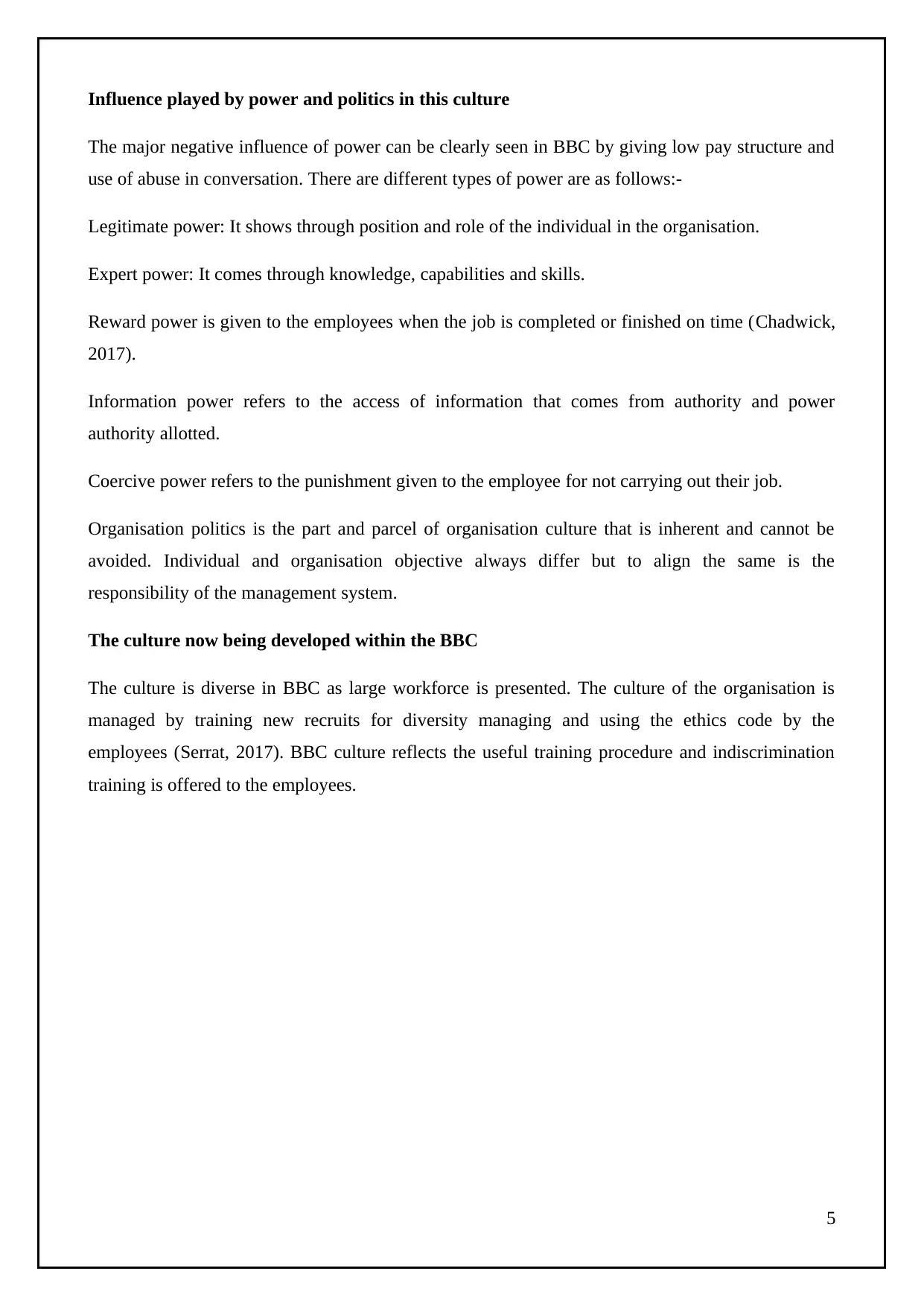
Influence played by power and politics in this culture
The major negative influence of power can be clearly seen in BBC by giving low pay structure and
use of abuse in conversation. There are different types of power are as follows:-
Legitimate power: It shows through position and role of the individual in the organisation.
Expert power: It comes through knowledge, capabilities and skills.
Reward power is given to the employees when the job is completed or finished on time (Chadwick,
2017).
Information power refers to the access of information that comes from authority and power
authority allotted.
Coercive power refers to the punishment given to the employee for not carrying out their job.
Organisation politics is the part and parcel of organisation culture that is inherent and cannot be
avoided. Individual and organisation objective always differ but to align the same is the
responsibility of the management system.
The culture now being developed within the BBC
The culture is diverse in BBC as large workforce is presented. The culture of the organisation is
managed by training new recruits for diversity managing and using the ethics code by the
employees (Serrat, 2017). BBC culture reflects the useful training procedure and indiscrimination
training is offered to the employees.
5
The major negative influence of power can be clearly seen in BBC by giving low pay structure and
use of abuse in conversation. There are different types of power are as follows:-
Legitimate power: It shows through position and role of the individual in the organisation.
Expert power: It comes through knowledge, capabilities and skills.
Reward power is given to the employees when the job is completed or finished on time (Chadwick,
2017).
Information power refers to the access of information that comes from authority and power
authority allotted.
Coercive power refers to the punishment given to the employee for not carrying out their job.
Organisation politics is the part and parcel of organisation culture that is inherent and cannot be
avoided. Individual and organisation objective always differ but to align the same is the
responsibility of the management system.
The culture now being developed within the BBC
The culture is diverse in BBC as large workforce is presented. The culture of the organisation is
managed by training new recruits for diversity managing and using the ethics code by the
employees (Serrat, 2017). BBC culture reflects the useful training procedure and indiscrimination
training is offered to the employees.
5
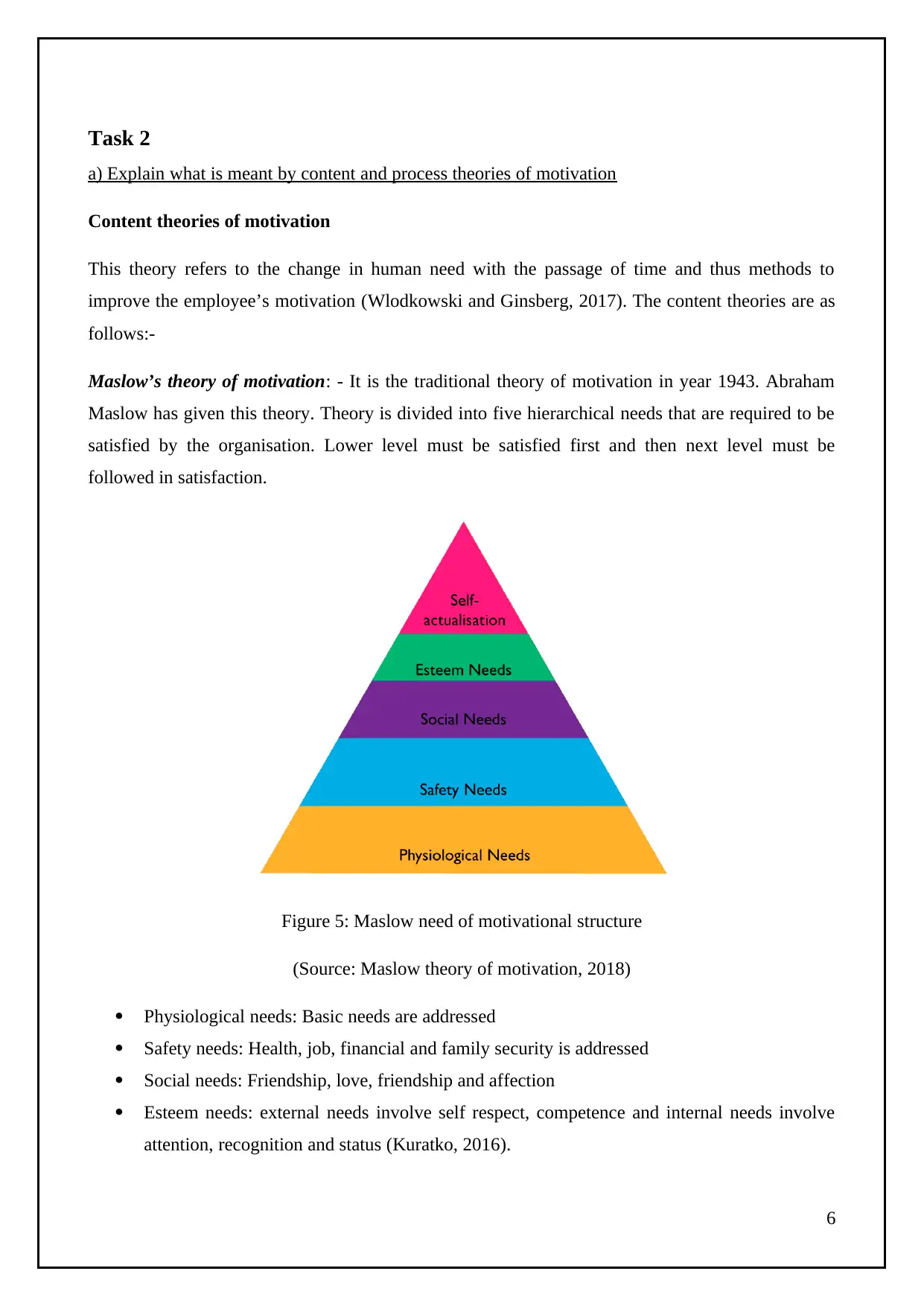
Task 2
a) Explain what is meant by content and process theories of motivation
Content theories of motivation
This theory refers to the change in human need with the passage of time and thus methods to
improve the employee’s motivation (Wlodkowski and Ginsberg, 2017). The content theories are as
follows:-
Maslow’s theory of motivation: - It is the traditional theory of motivation in year 1943. Abraham
Maslow has given this theory. Theory is divided into five hierarchical needs that are required to be
satisfied by the organisation. Lower level must be satisfied first and then next level must be
followed in satisfaction.
Figure 5: Maslow need of motivational structure
(Source: Maslow theory of motivation, 2018)
Physiological needs: Basic needs are addressed
Safety needs: Health, job, financial and family security is addressed
Social needs: Friendship, love, friendship and affection
Esteem needs: external needs involve self respect, competence and internal needs involve
attention, recognition and status (Kuratko, 2016).
6
a) Explain what is meant by content and process theories of motivation
Content theories of motivation
This theory refers to the change in human need with the passage of time and thus methods to
improve the employee’s motivation (Wlodkowski and Ginsberg, 2017). The content theories are as
follows:-
Maslow’s theory of motivation: - It is the traditional theory of motivation in year 1943. Abraham
Maslow has given this theory. Theory is divided into five hierarchical needs that are required to be
satisfied by the organisation. Lower level must be satisfied first and then next level must be
followed in satisfaction.
Figure 5: Maslow need of motivational structure
(Source: Maslow theory of motivation, 2018)
Physiological needs: Basic needs are addressed
Safety needs: Health, job, financial and family security is addressed
Social needs: Friendship, love, friendship and affection
Esteem needs: external needs involve self respect, competence and internal needs involve
attention, recognition and status (Kuratko, 2016).
6
⊘ This is a preview!⊘
Do you want full access?
Subscribe today to unlock all pages.

Trusted by 1+ million students worldwide
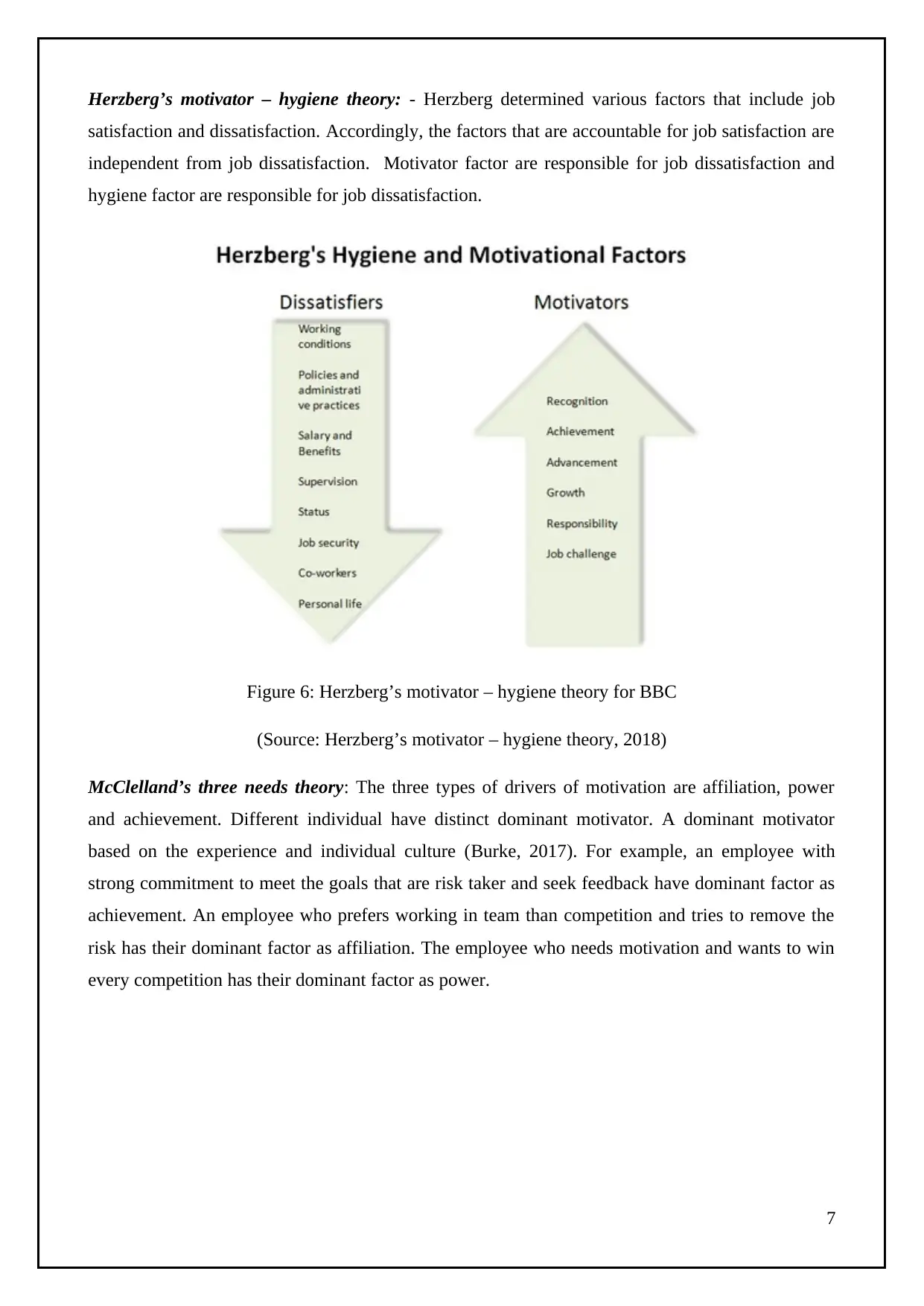
Herzberg’s motivator – hygiene theory: - Herzberg determined various factors that include job
satisfaction and dissatisfaction. Accordingly, the factors that are accountable for job satisfaction are
independent from job dissatisfaction. Motivator factor are responsible for job dissatisfaction and
hygiene factor are responsible for job dissatisfaction.
Figure 6: Herzberg’s motivator – hygiene theory for BBC
(Source: Herzberg’s motivator – hygiene theory, 2018)
McClelland’s three needs theory: The three types of drivers of motivation are affiliation, power
and achievement. Different individual have distinct dominant motivator. A dominant motivator
based on the experience and individual culture (Burke, 2017). For example, an employee with
strong commitment to meet the goals that are risk taker and seek feedback have dominant factor as
achievement. An employee who prefers working in team than competition and tries to remove the
risk has their dominant factor as affiliation. The employee who needs motivation and wants to win
every competition has their dominant factor as power.
7
satisfaction and dissatisfaction. Accordingly, the factors that are accountable for job satisfaction are
independent from job dissatisfaction. Motivator factor are responsible for job dissatisfaction and
hygiene factor are responsible for job dissatisfaction.
Figure 6: Herzberg’s motivator – hygiene theory for BBC
(Source: Herzberg’s motivator – hygiene theory, 2018)
McClelland’s three needs theory: The three types of drivers of motivation are affiliation, power
and achievement. Different individual have distinct dominant motivator. A dominant motivator
based on the experience and individual culture (Burke, 2017). For example, an employee with
strong commitment to meet the goals that are risk taker and seek feedback have dominant factor as
achievement. An employee who prefers working in team than competition and tries to remove the
risk has their dominant factor as affiliation. The employee who needs motivation and wants to win
every competition has their dominant factor as power.
7
Paraphrase This Document
Need a fresh take? Get an instant paraphrase of this document with our AI Paraphraser
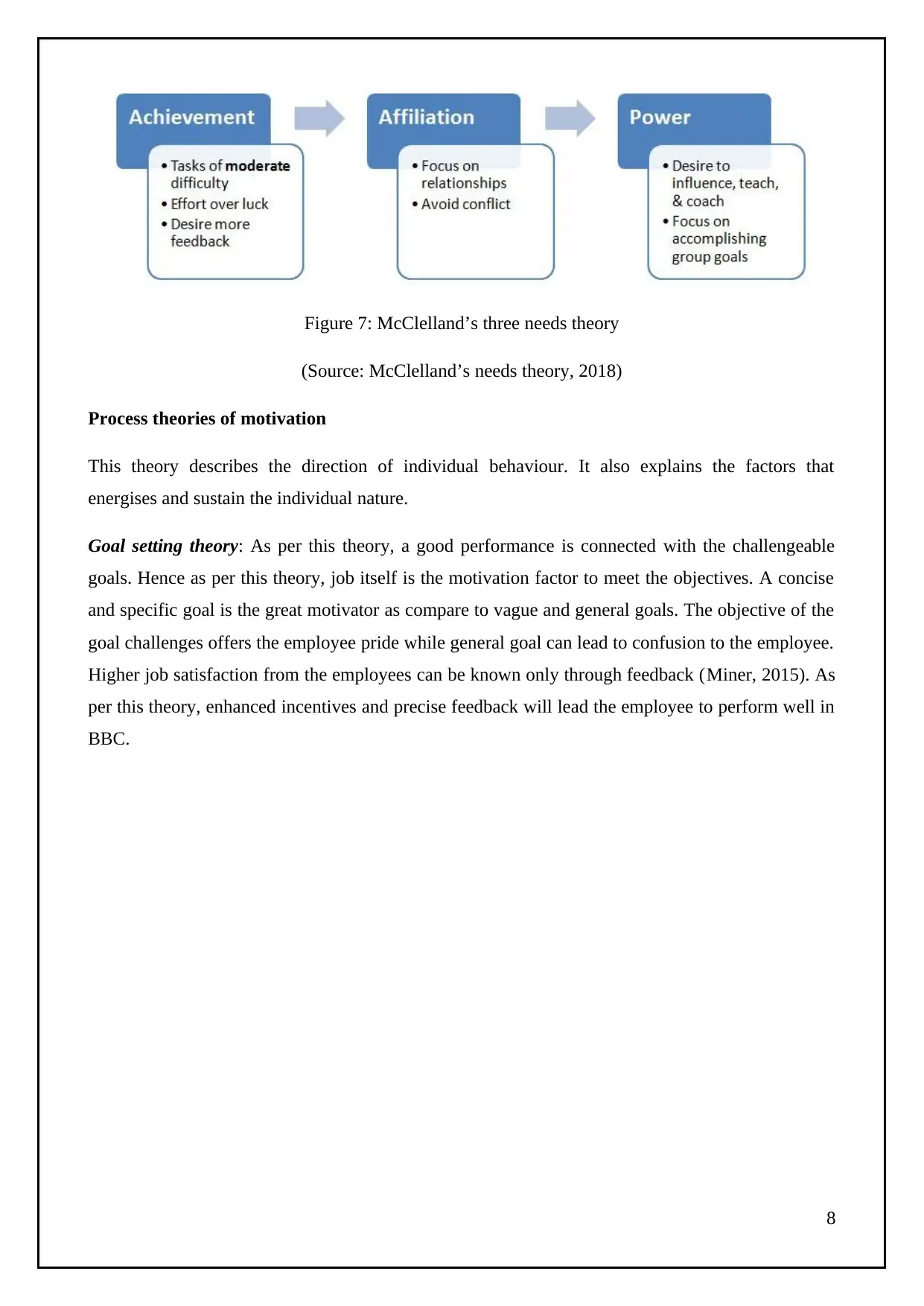
Figure 7: McClelland’s three needs theory
(Source: McClelland’s needs theory, 2018)
Process theories of motivation
This theory describes the direction of individual behaviour. It also explains the factors that
energises and sustain the individual nature.
Goal setting theory: As per this theory, a good performance is connected with the challengeable
goals. Hence as per this theory, job itself is the motivation factor to meet the objectives. A concise
and specific goal is the great motivator as compare to vague and general goals. The objective of the
goal challenges offers the employee pride while general goal can lead to confusion to the employee.
Higher job satisfaction from the employees can be known only through feedback (Miner, 2015). As
per this theory, enhanced incentives and precise feedback will lead the employee to perform well in
BBC.
8
(Source: McClelland’s needs theory, 2018)
Process theories of motivation
This theory describes the direction of individual behaviour. It also explains the factors that
energises and sustain the individual nature.
Goal setting theory: As per this theory, a good performance is connected with the challengeable
goals. Hence as per this theory, job itself is the motivation factor to meet the objectives. A concise
and specific goal is the great motivator as compare to vague and general goals. The objective of the
goal challenges offers the employee pride while general goal can lead to confusion to the employee.
Higher job satisfaction from the employees can be known only through feedback (Miner, 2015). As
per this theory, enhanced incentives and precise feedback will lead the employee to perform well in
BBC.
8
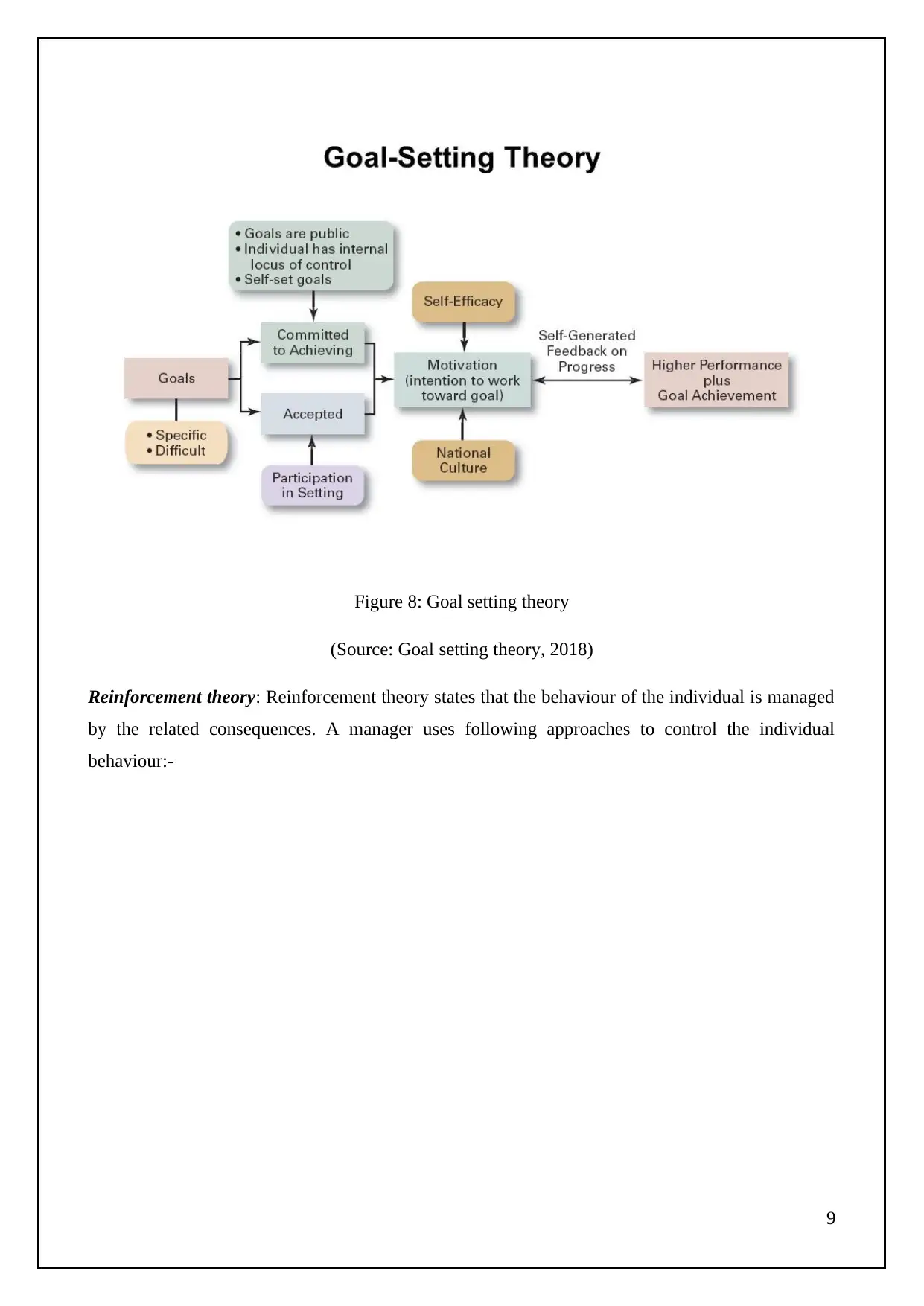
Figure 8: Goal setting theory
(Source: Goal setting theory, 2018)
Reinforcement theory: Reinforcement theory states that the behaviour of the individual is managed
by the related consequences. A manager uses following approaches to control the individual
behaviour:-
9
(Source: Goal setting theory, 2018)
Reinforcement theory: Reinforcement theory states that the behaviour of the individual is managed
by the related consequences. A manager uses following approaches to control the individual
behaviour:-
9
⊘ This is a preview!⊘
Do you want full access?
Subscribe today to unlock all pages.

Trusted by 1+ million students worldwide
1 out of 24
Related Documents
Your All-in-One AI-Powered Toolkit for Academic Success.
+13062052269
info@desklib.com
Available 24*7 on WhatsApp / Email
![[object Object]](/_next/static/media/star-bottom.7253800d.svg)
Unlock your academic potential
Copyright © 2020–2026 A2Z Services. All Rights Reserved. Developed and managed by ZUCOL.





